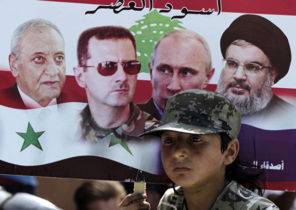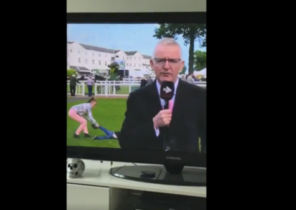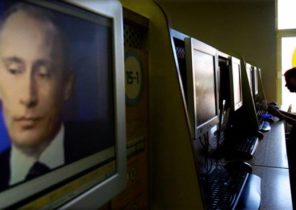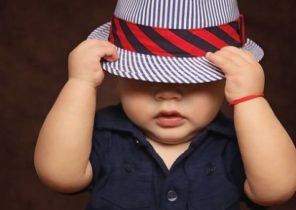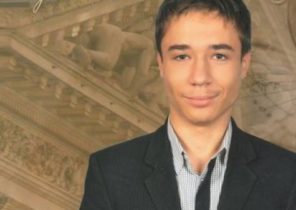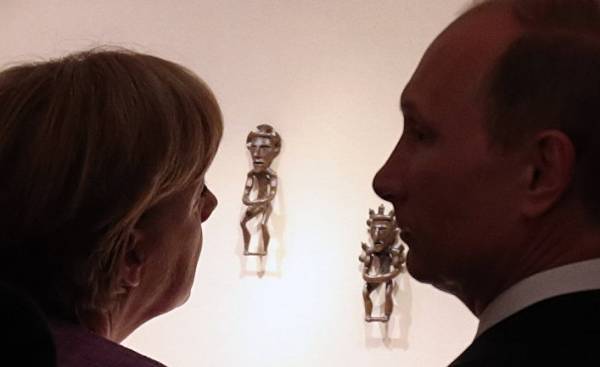
He was very thin in his elegant dark suit, excited and surprisingly young for the President. Speaking under the dome of the restored Reichstag building, Vladimir Putin quickly switched to German. His brilliant command of German impressed the members of the German Parliament, and his speech inspired them. It seemed that the cold war is over.
It happened in 2001, after just a few weeks after the September 11 attacks, and Mr. Putin expressed his solidarity with the American people, and then described a picture of the European future of Russia. He was the first Russian leader addressed to the German Parliament, and the legislators gave him a standing ovation, delighted by the fact that he spoke their language.
Only Angela Merkel, who at the time was still relatively untested leader of the opposition, did not share their admiration. She, too, rose to applaud Mr. Putin, but she said something standing next to a member of Parliament who, like herself, grew up in Communist East Germany. She knew how Mr. Putin managed so well to learn the German language.
“For it is to thank the Stasi,” said Ms. Merkel, referring to the secret police of East Germany, which cooperated with Mr. Putin in the period when he was a young KGB officer in Dresden.
Fast forward now 15 years, in a world where the cold war seems to be again gaining momentum and in which a procession of American and European leaders tried to improve relations with Russia, failed. In this world there is only Ms. Merkel and Mr. Putin. Their relationship and their rivalry is the focus of the conflict completely opposite views, a split that could have much more serious consequences now, when it is unclear what will be the policy of Donald trump against Russia and will he reconsider the value of traditional alliances for American foreign policy.
62-year-old Ms. Merkel is the undisputed leader of Europe, a little weary, but resolute defender of the European Union and Western liberal values. 64-year-old Mr. Putin has turned into the equivalent of a modern Russian Tsar, seeking to split Europe and the liberal Western order. He managed to survive George W. Bush and Barack Obama in America, Tony Blair, David Cameron, Jacques Chirac and Nicolas Sarkozy in Europe. Sponsored by the Russian government group hackers now charged with thwarting the plans of Hillary Clinton, he hoped to get into the White house.
Now at stake is the fate of Europe, as we approach the elections in the Netherlands, France, maybe Italy and Germany, where Ms. Merkel will be re-elected. And Mr. Putin is invisibly present and has an impact on election campaigns in these countries, inspiring angry European populists who are close to his nationalist spirit. Moreover, Russia is also suspected of trying to interfere in European elections by hacker attacks and disinformation campaigns. If Ms. Merkel can’t win, it would mean that Mr. Putin managed to beat his last opponent.
“Chancellor Merkel is the most loyal guardian of the concept of the liberal West, which has existed for 70 years,” said strobe Talbott (Strobe Talbott), who was an adviser to President bill Clinton for Russia, adding that this is what makes it the number one target for Mr. Putin.
New geopolitical dynamics will manifest themselves on Tuesday, March 14, when Ms. Merkel will visit the White house to hold its first meeting with Mr. trump. In turn on Thursday, Mr. Putin invited German Chancellor to visit Moscow in the near future. This kind of game in poker, which are players and which enters a new third player.
In 2000, when the West tried to assess the new Russian leader, confusion of the West found expression in a question that sounded in Davos, Switzerland: “Who is Mr. Putin?” Many years have passed, and Mr. Putin has remained a mystery — a leader who is sometimes portrayed ridiculous macho with no shirt on, and sometimes Slavic Machiavelli.
However, it would be appropriate to ask: “And who is Ms. Merkel?” Pragmatic, de-ideologized and careful, Ms. Merkel also remains largely a mystery. Her status as “mom” Germany is more a reflection of the bias of the German media and political class dominated by men, who still don’t know which category should carry strong woman.
Over the years between Ms. Merkel and Mr. Putin had many meetings and telephone conversations, however, they failed to achieve a breakthrough and establish partnerships that could be compared with the relations between Prime Minister Margaret Thatcher and the last leader of the Soviet Union Mikhail Gorbachev. If the couple has helped the world to get out of the cold war, the relationship of Mr. Putin and Ms. Merkel, as it may seem, are trapped in this war and are influenced by completely different experience, which they received in East Germany.
Ms. Merkel, who was never any friend or enemy, always encouraged Mr. Putin and Russia to build relations based on rules, not emotion, on the basis of shared interests, not personal sympathies. In turn, Mr. Putin has always wanted to find in Europe, ready to conclude with Russia a big deal and guarantee her a fixed and privileged role in the decision-making process.
Before to power in Germany came to Ms. Merkel, Mr. Putin managed to establish such rapport with her predecessor, Gerhard Schroeder. Now one of the heirs of Mr. Schroeder, Martin Schulz (Martin Schulz), who heads the centre-left social democratic party is the strongest opponent of Ms. Merkel. If returned to power, the social Democrats with their warmer attitude towards Russia, it will be Mr. Putin’s real gift. He also hoped for a more friendly adjusted management in France.
Relations between Mr. Putin and Ms. Merkel are determined by suspicion, mutual suspicion and possibly mutual respect. However, they had missed opportunities, and errors in judgment, which reached a new climax now, when Ms. Merkel is preparing for new elections, and accuse Russia of trying to prevent her re-election.
The experience of living in East Germany
The first political memory of Ms. Merkel dates back to the time when she was 7 years old and she lived in the town of Templin in East Germany, where her father was a Lutheran pastor. 13 August 1961 in the city came news that the Soviet Union began the construction of the wall, which divided Berlin into Eastern and Western parts. The little angel saw many members of the Church her father openly wept that morning.
The most crucial point for her was November 1989 when the Berlin wall came down. The long years that have passed between these two events, and defined the character of Ms. Merkel as a politician. She was careful, calculating, and a bit idealistic, she was suspicious of Russia, but at the same time admired her, she studied Russian literature and culture, and fairly well mastered the Russian language to go to the Soviet Union as a student.
As she was growing up in East Germany under the regime, which she called a dictatorship — Ms. Merkel used to endlessly repeat meaningless platitudes Soviet and listen to mind-numbing texts of decrees, a daily broadcast on state radio. “We had daily to put up with it,’ recalled Ms. Merkel in 2009, during his interview to the newspaper Der Spiegel. — Just a miracle that we were able to forget it.”
It is not surprising that Ms. Merkel does not feel especially tender feelings for the Russian, as some social Democrats who grew up in democratic West Germany and marked by reconciliation with the Soviet Union, resulting Ostpolitik, that is, the policy of detente of the 1970-ies. In East Germany the Stasi and the KGB stood at the head of one of the largest spyware States of the Soviet bloc. Distrust and mediocrity were widespread, however, according to Ms. Merkel, few people thought that this system will collapse.
“And when all had given up hope — she recalled, — it happened”.
Ms. Merkel came to the conclusion that the decision of some problems such as the conflict in Ukraine takes a lot of time, and it is important to be patient. Meanwhile, the conclusion of Mr. Putin, who seeks to undermine the foundations of the European Union, quite possibly, is that sometimes political systems that at first glance look indestructible, can suddenly be very vulnerable.
Mr. Putin, born in 1952, grew up in a communal apartment in the back alleys of Leningrad, the city that survived the Nazi blockade and famine, resulting in the death of his elder brother, whom Mr. Putin did not know. Mr. Putin studied law at Leningrad, while Ms. Merkel has made a choice in favor of the natural Sciences, because, as she later explained, they “facts cannot be changed so” how they could be changed into so-called history or law, which was imposed by the Communists.
Mr. Putin joined the KGB in 1985 and immediately went to Dresden. After the fall of the Berlin wall the Germans were celebrating the reunification of their country and the departure of Soviet troops, but Ms. Merkel was deeply immersed in the democratic politics of their new country.
Mr. Putin complained that it all happened too fast, once called the collapse of the Soviet Union “the greatest geopolitical catastrophe of the 20th century”.
In 2000, when the Kremlin arrived three journalists, who were instructed to write a book about Mr. Putin, he told them that Russia could have avoided many problems, if the Soviet forces hastily left Eastern Europe.
Mr. Putin, being a KGB agent, watched the horrors of Dresden. The head of the local branch of the Stasi, the KGB, which worked closely, was arrested and committed suicide by overdosing on sleeping pills and fallen asleep near a gas stove with open burners. Mr. Putin later recalled how a crowd of angry people gathered in front of the KGB building. Fearing pogroms, Mr. Putin asked for help from the Soviet military, who were nearby, but he was told that the order has to come from Moscow.
“Moscow is silent,” said he. Eventually the crowd dispersed, but this tragic episode has left Mr. Putin “a sense that the country is no more”.
Later, Mr. Putin told, what lesson he learned from all of this: he understood that the government needed to assert boldly, both within Russia and outside it — otherwise, Russia will suffer the fate of the Soviet Union. According to him, the Soviet Union was a deadly disease, which no medicine: “paralysis”.
On the rise
Despite the fact that Mr. Putin and Ms. Merkel became the leaders of their coming, few expected.
Little-known outside of Russia and even inside it, Mr. Putin became the President of the country after 31 December 1999, Boris Yeltsin unexpectedly resigned. A little later, Ms. Merkel headed the center-right Christian democratic Union, shifting his mentor, former Chancellor of Germany Helmut Kohl. Ms. Merkel, who is often underestimated due to the fact that she is a woman, proved the fallacy of the judgment of the skeptics, becoming Chancellor of Germany in 2005.
During the first official visit of Mrs Merkel in Moscow in early 2006, Mr. Putin has shown his style to play the game, giving Ms. Merkel plush dog, despite the fact that the Kremlin was aware of the fact that the Chancellor does not like and is afraid of dogs. A year later, during the negotiations, which took place on the black sea coast, he allowed his Labrador to go into the room where was Ms. Merkel.
Toomas Ilves (Toomas Ilves), who held the post of the President of Estonia until last year, called this trick with the dog, “a classic move of the KGB”. According to Mr. Ilves, Ms. Merkel never had illusions about Russia, and she, of course, clearly understand what kind of country is Russia under Mr. Putin.
“She grew up in Stasiland, he said. So she was well aware of what he was dealing with”.
However, Ms. Merkel did not change the German tradition, which was frequent in meetings with Russian leaders. It has positioned itself as the main intermediary between Europe and Russia, while maintaining long-term business relations between the two countries.
Ms. Merkel has repeatedly criticized Mr. Putin, speaking in support of democracy and protection of human rights, meeting with Russian opposition figures and expressing outrage at the murder of Russian journalist Anna Politkovskaya in 2006.
A few days later after the murder, Mr. Putin once again came to Dresden. He and Ms. Merkel gave a joint interview to a local German TV channel, during which Mr Putin was briefly lost his composure when asked about the murder of Ms. Politkovskaya. This piece of the interview was cut, however, viewers saw how Mr. Putin praises Ms. Merkel because she was such a good listener that, in his words, is “a rare quality among women.”
Konstantin Eggert, a Russian journalist who for several years spoke with Ms. Merkel, said that the Kremlin never understood the Chancellor, believing that she and Mr. Schroeder, “will remain in the thrall of German business and the traditional German belief in Ostpolitik”.
“But she was never in anyone’s prisoner.”
Coded signals
Mr. Kohl made friends with Mr. Gorbachev in the sauna. Mr. Schroeder liked Mr. Putin, because they were close to each other in spirit. But Ms. Merkel has been different. “She always thought all these nasty masculine habits,” said Stefan Cornelius (Kornelius Stefan), biographer of Ms. Merkel.
Ms. Merkel was impressed by Mr. Putin for his ability to notice the details — Mr. Putin also has them — as well as his knowledge of Russia and its culture and willingness to defend his beliefs as he defends his. The conference on security, held in Munich in 2007, Mr. Putin gave a speech, which, as later became clear, had marked a turning point in Russian foreign policy, which is then made against the West and the dominance of America in world Affairs.
Karl-Theodor zu Guttenberg (Karl-Theodor zu Guttenberg), who was the Minister of defence of Ms. Merkel recalled that, while many in the audience, including us officials, were shocked and alarmed by the tone of Mr. Putin, Ms. Merkel, “it seemed, was not surprised. She has a huge suspicious in a larger strategy of Mr. Putin.”
Once the determination of Ms. Merkel may have led to negative consequences. At the meeting of leaders of the countries-members of NATO, held in Romania in 2008, Ms. Merkel, with the support of the French President, Mr. Sarkozy, successfully opposed calls for Mr. Bush to grant Ukraine and Georgia the plan of action on preparation for membership in NATO — which ultimately could help them to join the military Alliance.
To give the White house an opportunity to save face, the Chancellor has undertaken the preparation of the communiqué, on the one hand, said the denial of an action plan to Ukraine and Georgia, have stressed that they still one day will be part of the Alliance.
“Merkel has appeared with the heart of the negotiations over the wording, of course, getting a pleasure from it recalled Italy’s Ambassador to NATO Stefano Stefanini (Stefanini Stefano), who took part in that meeting. She knew that she is very good at it”.
Ultimately, however, Ms. Merkel is likely miscalculated. Ukraine and Georgia were very angry failure. No less angry were and Mr. Putin, who took a vague promise to accept Ukraine and Georgia into NATO as evidence of the desire of the Alliance to continue its eastward expansion into the former Soviet Union.
“For him it was a slap in the face — the proposal, which stated that Ukraine and Georgia will become members of NATO”, — said Mr. Stefanini. At the same time, Mr. Putin felt that he now had a free hand, because Washington could not insist on the beginning of the formal procedures in preparation for accession to these two former Soviet republics into NATO.
Four months later Russia invaded Georgia, checking the readiness of the West to intervene — the West did not intervene. This in turn served as a precedent for the seizure of the Crimean Peninsula and Russia’s invasion of Ukraine in 2014.
Ukraine was a turning point. Accustomed to the role of chief mediator between Europe and Moscow, Ms. Merkel now had to fulfill her role as enablers of economic sanctions.
Vladislav Belov, head of the Center for German studies Institute of Europe Russian Academy of Sciences, noted that Mr. Putin has embraced the fact that Ms. Merkel has assumed a major role in the policy of sanctions as a personal insult. “Putin does not understand why Germany just didn’t accept that Russia swallowed Crimea”, — said Mr. Belov, adding that Mr. Putin compared the reunification of Germany in 1990 “reunification” of Russia and Crimea.
While on the issue of sanctions Europe manages to stay together. However, the degree of solidarity is reduced, and it largely depends on the determination and political strength of Ms. Merkel, whose positions Mr. Putin hopes to weaken.
If there is a symbol of how things have changed over the period of Pro-Western speech of Mr. Putin in the Reichstag in 2001 up to the present time, it is possible, here it is: in February, the Russian defense Ministry said that it will build the layout of the Reichstag building on the outskirts of Moscow. This is not a friendly gesture of attention or respect. It will be used for the training of young Russian patriots how to storm the building in the event of war.

